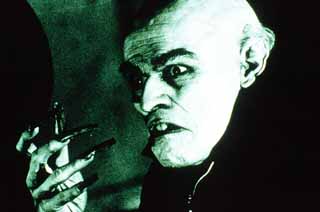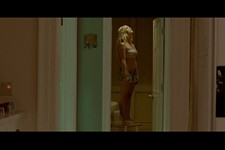As Max Schreck, Willem Dafoe Sinks His Teeth In
Dafoe has given some of the most riveting performances of the last couple of decades. With Shadow of the Vampire, he adds one mre to the list.
By Marjorie Baumgarten, Fri., Jan. 19, 2001

Very little is known about the German actor Max Schreck. Although he appeared in about 20 films during the Twenties and early Thirties, Murnau's Nosferatu remains the only work for which he's remembered (not counting the homage to him in Batman Returns). He cuts such an indelible figure as the vampire Count with his gaunt frame, sharp features, taloned fingernails, and funereal cloak that it's perhaps sadly appropriate that this singular image is Schreck's sole historical mark. This lack of biographical detail is also what enables the fictional conceit of Shadow of the Vampire: that Schreck, the actor, is an actual vampire. Schreck's spooky image in Nosferatu was also the starting point for Willem Dafoe, who plays him in Shadow. Indeed, Dafoe confesses the only real information he could find on Schreck before shooting was a description by a Murnau biographer who called him "an actor of no distinction."
About Dafoe, nothing of the kind might be said. A most distinctive and distinguished actor, both in theatre and film, Dafoe has a physical presence that commands attention from the get-go and the acting chops to play anyone from a junkie to Jesus Christ. From Streets of Fire, Platoon, and The Last Temptation of Christ to Born on the Fourth of July, Wild at Heart, Light Sleeper, and American Psycho, Dafoe has given some of the most riveting performances of the last couple of decades. His work in Shadow of the Vampire (opening in Austin on Jan. 26) has already earned him considerable praise and attention. I had the opportunity to talk with him last September at the Toronto International Film Festival after the film's first public screenings. Below are some excerpts from our conversation.
On the Differences Between Acting for Theatre and Film
"Theatre is where I come from. There are elements in the theatre that you just don't get in film. I like performing. I like being able to do it. It's not as fragmented as movies. Yes, of course there's the audience and all that, but for me, personally I like the athleticism of the theatre. I like the ritual of the theatre. I like the spirituality of the theatre. Film is fascinating, it's very collaborative, it's always curious to see how the different elements can come together. That's the beauty of it. And there are lots of rewards in film that you don't get from theatre -- socially, monetarily. But I think, basically, they feed each other."
On How He Reads a Script
"I trust people more than material because material is always transformed in the doing. Sometimes I think I don't even know how to read scripts anymore. Certain scripts are really, really difficult to read and I read so much that certain scripts I have to sit myself down and say, 'Read it slowly. Read it in bits if you have to.' Very technological scripts."
On How He Has Chosen His Roles
"You look at a script, and you say, 'Do I want to do this? Is this interesting? Does this make me curious? Do I want to find my way into this character? Do I want to empathize with this? Do I want to get in their mindset? Do I want to find out about what this is?' You can keep on addressing the same world but just naturally you look and say, 'Oh, I feel like I've just addressed this.' Sometimes you want something else. You feel like every story, every world, everything deals with the same issues, the same problems. So it's just about approaching it from different angles. It's a natural thing. I think it's kind of a crummy actors' idea of putting pressure on themselves to do lots of different things. That's not my desire. I can always deal with failure as long as I know I approached something for good reasons. And I trust curiosity. And I trust mystery. And I trust working from a passionate but unknowing place. And of course that sounds ridiculously contradictory, and it is."
On How He Approaches a Role
"I distrust as an actor being too in love with the material right off the bat. Which sounds really strange. But you can't be too reverential. You've got to riff on it and turn it into something else. You can't riff on it and still have it hanging on the bottom and being the base and having this be a little decoration on top. That's a cheat and not so interesting."
On Playing Max Schreck in Shadow of the Vampire
"It was very unique and very special. I always seek out a mask and this was the biggest and the most literal one imaginable."










